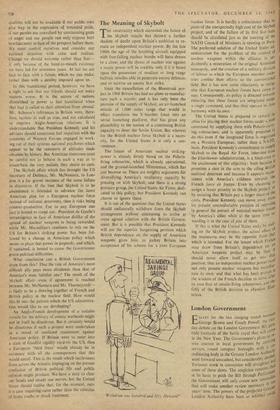The Meaning of Skybolt
THE uncertainty which surrounds the future of the Skybolt missile has thrown a further shadow of doubt upon Britain's ambition to re- main an independent nuclear power. By the late 1960s the age of the bombing aircraft equipped with free-falling nuclear bombs will have drawn to a close; and the threat of nuclear war against a major power will be credible only if it is based upon the possession of medium or long range ballistic missiles able to penetrate enemy defences and to survive an enemy first strike.
Since the cancellation of the Bluestreak pro- ject in 1960 Britain has had no plans to manufac- ture such a missile: and it has only been the promise of the supply of Skybolt, an air-launched missile of 1,(X)O miles range that would in effect transform the V-bomber force into an aerial launching platform, that has given any plausibility to the notion of a continuing British capacity to deter the Soviet Union. But whereas for the British nuclear force Skybolt is a neces- sity, for the United States it is only a con- venience.
The future of American nuclear striking- power is already firmly base4 on the Polaris- tiring submarine, which is already operational, and the ground-launched Minuteman, which has just become so. There are weighty arguments for diversifying America's retaliatory capacity by pressing on with Skyboll, and there is a strong pressure group, the United States Air Force, dedi- cated to this policy; but President Kennedy can choose to ignore them.
It is out of the question that the United States should unilaterally withdraw from the Skybolt arrangement without attempting to arrive at some agreed solution with the British Govern- ment. But it is possible that PreMdent Kennedy will use the superior bargaining position which British dependence on the supply of American weapons gives him, to jockey Britain into acceptance of his scheme for a joint European 'Withdraw one hundred and fifty, Ilewson?'
nuclear force. it is hardly a coincidence that re- ports of the unexpectedly high cost of the Skyboll project, and of the failure of its first five tests, should be circulated just as the meeting of the NATO Council of Ministers is opening in Paris. The preferred solution of the United States ad- ministration for the problem of the control of nuclear weapons within the alliance is WI" doubtedly a restoration of the original American monopoly, and the creation of a military division of labour in which the European member coun- tries confine their efforts to the conventional field. But it has now come reluctantly to recog- nise that European nuclear forces have come to stay. Consequently, its policy is directed towards ensuring that these forces are integrated ander a single command, and that they operate in Jose harmony with its own. The United States is prepared to reward it5 aiiiCS for placing their nuclear forces under a joint command by supplying them with Polaris-carrr ing submarines; and is apparently prepared 10 do this even if the integrated force is organis,,ti on a Western European, rather than a NAT' basis. President Kennedy's commitment to suPPIY Skybolt to the Royal Air Force, inherited frorn the Eisenhower administration, is a hindrance to the attainment of this objective: both because it promises a shot in the arm to the ailing British national deterrent and because it appears inc011' sistent with America's coldness towards the French force de frappe. Even by choosing t° assign a lesser priority to the Skybolt project, rn'. by insisting that Britain pay a larger share of the costs, President Kennedy can move_ away frclril his present_ uncomfortable position of 0OP0sittg in general the pursuit of national nuclear forces by America's allies while at the same time re• warding it in the case of 'one of them. It' this is what the United States seek; stall; in on the 'Skybott project, the actual effel the manteuvre may be the opposite front lha e which is intended. For the lesson which Fran‘.r1 may draw from Britain's dependence on a.t American weapons project may be that it should never allow itself to get into 11134 position; that an independent nuclear power al° not only possess nuclear weapons but manufac.; lure its own; and that what has been proven If the wisdom of the French decision to strive arthte its own fleet of missile-firing submarines, and tH folly of the British decision to abandon Blue- streak.


































 Previous page
Previous page